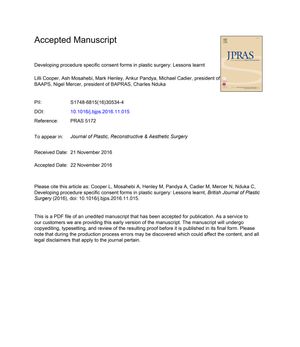Developing Procedure-Specific Consent Forms in Plastic Surgery: Lessons Learned
November 2016
in “
Journal of Plastic Reconstructive and Aesthetic Surgery
”

TLDR Custom-made consent forms for each plastic surgery procedure improve patient understanding and reduce legal issues.
The article discusses the development of procedure-specific consent forms (PSCFs) in plastic surgery to improve the consent process, communication, and documentation. The authors collaborated with the British Association of Plastic, Reconstructive and Aesthetic Surgeons (BAPRAS) and the British Association of Aesthetic Surgeons (BAAPS) to create eight PSCFs for common aesthetic procedures. An online survey of BAAPS members informed the development of these forms. The survey, conducted in September 2015, received responses from 91 out of 190 consultants, with 96% supporting the use of PSCFs and 93% willing to use an association-approved form. The article outlines lessons learned in designing PSCFs, including the importance of content that meets the reasonable patient standard, readability with a recommended reading age of 12, customization to individual patients, accessibility and distribution of the forms, the significance of dialogue in the consent process, and the potential for collaboration within and outside the specialty. The article emphasizes that PSCFs can help reduce litigation claims by ensuring informed consent and recommends a two-stage consent process focused on information sharing.